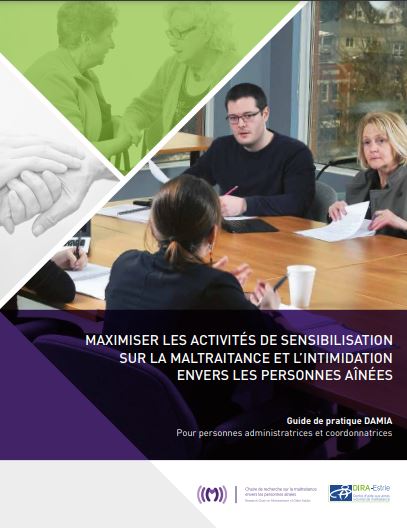PRESENTATION
The DAMIA (Seeking help in response to mistreatment and bullying of older adults) Practice Guide aims to develop and maximise awareness-raising practices to counter the mistreatment and bullying of older adults.
The guide is available in two volumes. The first is addressed to administrators and coordinators in community organisations and is entitled ‘Maximising Awareness-raising Activities on Mistreatment and Bullying of Older Adults’. This volume presents general information on mistreatment and bullying and proposes concrete action plans to develop, plan and deliver awareness-raising activitiess.
The second volume is meant for all persons, employees or volunteers, who lead awareness-raising activities in community organisations and intervene in situations of mistreatment and bullying of older adults. It is entitled, ‘Leading Awareness-raising Activities to Counter Mistreatment and Bullying of Older Adults’. This second volume offers information and concrete plans to prepare and support those who lead awareness-raising activities to counter mistreatment and bullying of older adults.
Both volumes are available in French and English.
ORIGIN AND EVOLUTION
The DAMIA Practice Guide results from the research-action project ‘Mistreatment and Bullying of Older Adults: Enhancing awareness practices in community-based organisations to promote the transition from awareness to reporting’. The project was jointly led by the Chair and DIRA-Estrie (Help Center for Older Adults in Situations of Mistreatment) from 2015 to 2018. The project resulted from DIRA-Estrie’s initiative in contacting the Research Chair when it found that, despite its efforts to raise awareness among older adults, requests for help did not significantly increase.
Community organisations involved with countering mistreatment and bullying, such as DIRA-Estrie, offer individual help and various awareness-raising activities. These activities aim to inform older adults on the available means, tools, resources and recourses to speak up about the situations of intimidation or bullying they have experienced or witnessed.
Such activities seek to help older adults recognise when they are being mistreated or bullied. However, many older adults hesitate to ask for help, and therefore, the effectiveness of these awareness-raising activities may be questioned. In theory, many obstacles to asking for help are known, such as fear of involving the police, the certainty that external help is unnecessary, feelings of shame and responsibility, fear of reprisals, fear of being relocated, etc. However, few studies have been done from the aspect of existing practices.
DEVELOPMENT
This research-action project was funded by the Québec ami des aînés (QADA) program from December 2015 to December 2018. Its goal was to identify 1) the obstacles to asking for help in situations of mistreatment and bullying and 2) older adults’ needs for awareness-raising material to enrich relevant practices in community organisations in contact with older adults.
During the first year, data collection from multiple sources established the state of knowledge concerning obstacles in seeking help and awareness-raising material and activities used by DIRA-Estrie and organisations in seven regional municipalities in the Estrie region. This data collection included: a literature review, a critical inventory of awareness-raising material and activities in the Estrie region (n=20), distribution of 305 questionnaires to older adults, 17 group interviews of older adults (n=144), one group interview with administrators of community organisations serving older adults (n=11), and one group interview with administrators, intervenors and volunteers of DIRA-Estrie (n=8).
During the project’s second year, qualitative and quantitative analysis of the collected data cleared the way for emergent practices found in the Practice Guides. In the third year, an evaluation of the Practice Guide’s acceptability was done in different community organisations offering awareness-raising activities for older adults on mistreatment and bullying. Before distribution, the Guide was revised and finalised according to the established knowledge transfer plan.
ACCESS TO THE PRACTICE GUIDE
Both volumes of the DAMIA Practice Guide are available for download, free of charge, on the Chair’s website. It is also possible to consult the volumes through the following links:
French language version:
- Volume addressed to administrators and awareness-raising activities coordinators in community organisations.
- Volume addressed to persons, employees or volunteers, who lead awareness-raising activities in community organisations.
English language version:
- Volume addressed to administrators and awareness-raising activities coordinators in community organisations.
- Volume addressed to persons, employees or volunteers, who lead awareness-raising activities in community organisations.
For optimal use of the DAMIA Practice Guides, a 90-minute or half-day training session offered by the Chair is recommended. Please contact the Chair by e-mail or telephone at 819-780-2022 Extension 45621.
REFERENCES ASSOCIATED WITH THE PRACTICE GUIDE:
References (in French and English) for the DAMIA Practice Guide
- Beaulieu, M., Pelletier, C. et Dubuc, M.-P. (2018). Animation d’activités de sensibilisation pour lutter contre la maltraitance et l’intimidation envers les personnes aînées : Guide de pratique DAMIA Pour toute personne qui anime. Québec. 46 p.
- Beaulieu, M., Pelletier, C. & Dubuc, M.-P. (2018). Animating awareness-raising activities to counter mistreatment and bullying of older adults: DAMIA Practice Guide. For all activities leaders. Québec. 46 p.
- Beaulieu, M., Pelletier, C. et Dubuc, M.-P. (2018). Maximiser les activités de sensibilisation sur la maltraitance et l’intimidation envers les personnes aînées : Guide de pratique DAMIA. Pour personnes administratrices et coordonnatrices. Québec. 78 p.
- Beaulieu, M., Pelletier, C. & Dubuc, M.-P. (2018). Maximising awareness-raising activities to increase understanding of the mistreatment and bullying experienced by older adults: DAMIA Practice Guide. For administrators and coordinators. Québec. 78 p.
